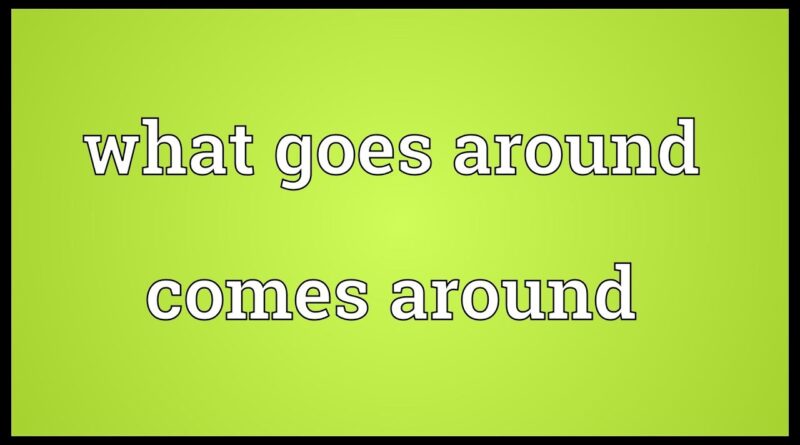Whatever Comes Around Goes Around Meaning
In the labyrinth of life’s complexities, there’s a simple adage that often emerges as a guiding principle: “What goes around comes around.” This timeless saying encapsulates the idea of karma, the notion that our actions, whether positive or negative, will eventually return to us in kind. While the concept may seem simplistic on the surface, its implications delve deep into the realms of morality, justice, and the interconnectedness of human existence.
Origins and Cultural Significance
The origins of the phrase “What goes around comes around” are somewhat elusive, as it aligns closely with the concept of karma, which has roots in various spiritual and philosophical traditions, including Hinduism, Buddhism, and Jainism. In essence, karma refers to the law of cause and effect, suggesting that our actions have consequences that reverberate through time and space.
Despite its spiritual origins, the idea has permeated popular culture and everyday language, transcending its religious connotations to become a universally recognized principle. From ancient Eastern philosophies to modern Western idioms, variations of this notion can be found across different cultures and languages, underscoring its enduring relevance and resonance.
The Moral Imperative
At its core, the principle of “What goes around comes around” serves as a moral compass, reminding us of the ethical implications of our actions. It suggests that kindness begets kindness, while cruelty invites its own retribution. In a world where moral ambiguity often reigns, this simple yet profound maxim offers a guiding light, urging us to consider the consequences of our behavior on others and ourselves.
Indeed, the belief in cosmic justice, where virtuous deeds are rewarded and malevolent acts are punished, provides a sense of order and accountability in an otherwise chaotic universe. Whether one subscribes to a particular religious doctrine or not, the idea that our actions have repercussions resonates deeply with our innate sense of fairness and justice.
Personal Reflection and Self-Realization
On a personal level, embracing the principle of “What goes around comes around” can lead to profound introspection and self-awareness. By acknowledging the interconnectedness of our actions and their eventual outcomes, we are prompted to take greater responsibility for our choices and behaviors. This heightened awareness fosters personal growth and development, as we strive to align our actions with our values and principles.
Moreover, the concept invites us to cultivate empathy and compassion towards others, recognizing that we are all interconnected in the intricate web of existence. Just as our actions can impact those around us, so too are we influenced by the deeds of others. In this way, the principle of reciprocity serves as a catalyst for building meaningful relationships and fostering a sense of community and mutual support.
The Ripple Effect
Beyond the individual level, the principle of “What goes around comes around” extends to the broader social and environmental contexts. Like ripples on a pond, our actions have far-reaching consequences that extend beyond our immediate sphere of influence. Whether it’s the environmental impact of our consumption habits or the ripple effects of our social interactions, every choice we make sends out waves that reverberate through the fabric of society.
In an age of global interconnectedness, where the actions of individuals and nations are intertwined like never before, the importance of mindful living and responsible stewardship cannot be overstated. By recognizing the interconnectedness of all living beings and the delicate balance of the natural world, we are compelled to act with greater mindfulness and intentionality, knowing that our choices have the power to shape the world for better or for worse.
Conclusion
In the grand tapestry of existence, the principle of “What goes around comes around” serves as a poignant reminder of the interconnectedness of all things. Whether viewed through the lens of karma, morality, or cosmic justice, the notion that our actions have consequences is a universal truth that transcends cultural boundaries and religious beliefs.
By embracing this principle, we are empowered to live with greater awareness, integrity, and compassion, knowing that our choices have the power to shape not only our own destiny but also the destiny of the world at large. In a world beset by division and discord, the timeless wisdom of “What goes around comes around” offers a beacon of hope and a pathway towards a more harmonious and equitable future.
